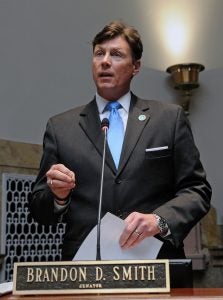Senate Bill 100 would reduce energy credits for solar customers
Published 7:08 pm Thursday, February 14, 2019

- File photo by Ben Kleppinger Wilderness Trace Solar is a Danville-based company that installs residential and commercial solar arrays.
For the third year in a row, Kentucky legislators are considering a bill to reduce “net metering” credits earned by residential electricity customers with solar panels.
Senate Bill 100 passed the Senate 23-12 on Wednesday and was advanced by the House Natural Resources and Energy Committee Thursday. It would end Kentucky’s current 1-to-1 kilowatt-hour credit for homes with solar panels that can feed power back onto the power grid for other users to consume.
John Cotten, who runs Wilderness Trace Solar in Danville and has worked against similar bills in previous years, said not everything in the bill is bad, but there are quite a few problems that would harm the state’s rooftop solar industry while benefiting utility companies.
There’s an increase in how big a residential solar array can be from 30 kilowatts to 45 kilowatts; and better grandfather protections for existing solar arrays than in previous bills. But it would certainly lessen how much solar customers could earn in credits; and it would put solar at a disadvantage when rates for credits are set, Cotten said.

LRC Public Information
Sen. Brandon Smith (R-Hazard) presents Senate Bill 100, a bill regarding net metering, in the Senate Wednesday.
“There is no direct verbal language that says the value of solar has to be accounted as part of the process,” he said. “It’s basically like going to court and having the judge tell you your attorney can’t represent you.”
What impact could the bill have on companies like Wilderness Trace Solar?
“The only thing I know is I don’t have a firm handle on it,” Cotten said. “It’s not going to help us — that’s for certain. It’s going to cut out a portion of residential sales — there’s no doubt about that at all.”
Supporters of the bill argue Kentucky’s current net metering law is too generous to solar customers.
Jerry Carter, president and CEO of Inter-County Energy in Danville, said the utility company “supports any policies which protect our local consumer-members and our ability to safely and reliably serve them with affordable electricity.”
“As a result, we support the effort to reform the net-metering law in Frankfort because the current law is outdated and sets an artificially high compensation rate for excess energy generated by private solar panels,” Cater said. “Senate Bill 100 takes politics out of setting that rate and trusts the expertise of the Public Service Commission to determine a fair, just and reasonable rate.”
How does it work?
Under current law, residential customers with solar panels have the ability to let the power generated by those panels flow onto the utility’s power grid when they are generating more electricity than the home is consuming. This happens most often in the middle of the day, when the sun is out and many people are working.
When solar power flows onto the power grid, the customer’s meter literally runs in reverse, providing the customer with a 1-kilowatt credit for every 1 kilowatt of energy provided. For example, If a customer pushes 5 kilowatts of solar power onto the grid during the day, then uses 7 kilowatts of electricity at night, they would only pay the electric company for 2 kilowatts.
House Bill 100 would redefine the term “net metering.” It would end the 1-to-1 ratio and require the Public Service Commission (PSC) to determine a new compensation rate for solar customers.
Cotten said that rate could wind up being 3 or 4 cents a kilowatt hour, a substantial reduction compared to current net metering.
Thursday testimony
David Samford, a Lexington attorney and former general counsel for the PSC, testified in favor of Senate Bill 100 before the House Natural Resources and Energy Committee Thursday morning.
Samford said current net metering essentially pays solar customers the full retail rate for the power they generate. The retail rate is set to cover not only the cost of the energy used, but the cost of building and maintaining the power grid the energy travels on, he said. Solar customers essentially avoid paying their fair share of grid maintenance costs under net metering, he argued.
Samford pointed out existing solar customers would be grandfathered in to continue receiving net metering credits for 25 years, and the grandfather clause would travel with a property, meaning if someone with solar panels sells their home, the solar panels will still generate net metering credits for the next owner.
Senate Bill 100 would also grandfather in any solar panels installed over the next year after it passes into law.
Tom Fitzgerald with the Kentucky Resources Council also testified; he said there is no proof that non-solar customers are subsidizing solar customers under net metering. In fact, the “only empirical evidence presented” during the multi-year debate over net metering is a study that found net metering has a “negligible impact” and it “would remain a negligible impact going forward.”
If solar customers aren’t paying their fair share because they use less electricity, then the same could be said of customers who have energy-efficient homes, Fitzgerald said.
Fitzgerald also warned the bill turns what is currently an energy credit into a financial credit, which could create additional problems. Solar customers could wind up owing taxes on their credits, and it “opens the door” for utility companies to argue that solar customers are “independent power producers” instead of residential customers with rooftop solar arrays, leading to even further reduced compensation, he said.
The utility companies are pushing Senate Bill 100 because “they want to push the independent solar producers out of the market so they can corner the market on the sun,” Fitzgerald said.
A quorum of the energy committee was not available Thursday morning, so no vote was taken on the bill then. The committee reconvened Thursday afternoon and passed the bill on to the full House.
Committee Chair Rep. Jim Gooch (R-Providence) said Thursday morning he believes after multiple years of debate, it’s time for the state to change its net metering law.
“When we have this many bills, there’s no way this many bills can be heard or totally vetted,” he said. “At some point in time, there comes a point in time where we have to vote on a bill … We think because of all the concessions that we have made, we have a bill that does not in any way threaten or harm the solar industry of Kentucky.”
This story has been updated to reflect that Senate Bill 100 was advanced by the House Natural Resources and Energy Committee to be considered by the full house.






